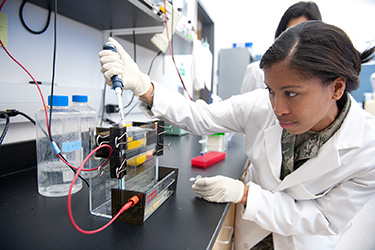DANCE (DN)
Technique courses (T) may be repeated once for credit, with permission of the instructor.
DN 101 (T) Beginning Ballet. 2 hours.
A studio course in classical ballet at the beginning level.
DN 110 (T) Introduction to Dance Styles. 2 hours.
Introduction to ballet, modern, and jazz dance through theory and practice at the beginning level.
DN 111 (T) Modern Dance Technique I. 3 hours.
Prerequisite: Dance major.
This course will introduce the basics of modern dance techniques.
DN 121 (T) Ballet Technique I-A. 3 hours.
Prerequisite: Dance major
A studio course in classical ballet for first year dance majors. Offered in the fall semester.
DN 122 (T) Ballet Technique I-B. 3 hours.
Prerequisite: Dance major.
The development of theory and practice of classical ballet for first year dance majors. Offered spring semester
DN 142 World Dance. 2 hours.
An introduction to dance movement as influenced by various cultures.
DN 151 (T) Jazz Technique I. 3 hours.
Prerequisite: Dance major.
Introduction to jazz dance technique and style through dance studio work.
DN 200 (T) Special Topics. 3 hours.
Prerequisite: Permission of instructor.
Investigation of dance theories and principles.
DN 210 (T) Dance Styles II. 3 hours.
Prerequisite: DN 110.
This course will include study of various dance styles at the intermediate level. The styles will represent dance forms from theatrical productions.
DN 211 (T) Modern Dance Technique II -A. 3 hours.
Prerequisite: Dance major.
 A studio course in modern dance technique at the intermediate level.
A studio course in modern dance technique at the intermediate level.
DN 212 (T) Modern Dance Technique II -B. 3 hours.
Prerequisite: Dance major.
A studio course in modern dance technique at the advanced intermediate level.
DN 221 (T) Ballet Technique II -A. 3 hours.
Prerequisite: DN 101 or DN 121 or permission of instructor.
Development of classical ballet technique, and performance quality at the intermediate level.
DN 222 (T) Ballet Technique II -B. 3 hours.
Prerequisite: DN 221 or permission of instructor.
Development of the classical theory and practice of ballet, at the intermediate level.
DN 240 Choreography I. 3 hours.
Prerequisite: Dance major.
Basic exploration of the rhythmic and spatial elements in the development of movement phrases and choreographic dance studies.
DN 251 (T) Jazz Technique II -A. 3 hours.
Prerequisite: Dance major.
A studio course in jazz dance technique at the intermediate level.
DN 252 (T) Jazz Technique II -B. 3 hours.
Prerequisite: Dance major.
A studio course in jazz dance technique at a more advanced intermediate level.
DN 265 Anatomy/Kinesiology for Dance. 3 hours.
 Prerequisite: Dance major.
Prerequisite: Dance major.
Lecture/studio course covering the basics of the musculoskeletal system and dance kinesiology.
DN 300 (T) Special Topics. 1 to 3 hours.
Prerequisite: Dance major or permission of instructor.
Study of dance theories and principles for performance, choreography or pedagogy.
DN 310 (T) Dance Styles III. 3 hours.
A studio course in various dance styles used for concert dance or theatrical productions.











